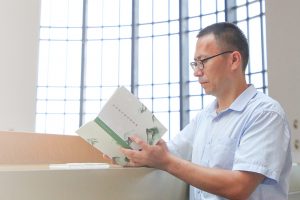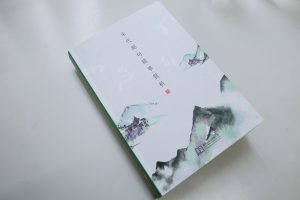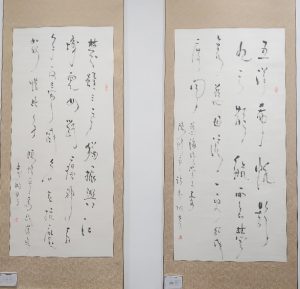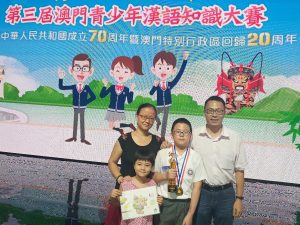Chen Xiuping, an associate professor and a Chinese medicine researcher in the Institute of Chinese Medical Sciences (ICMS) at the University of Macau (UM), is passionate about traditional Chinese culture, especially Song poetry. He even spent three years writing a book titled ‘Appreciation and Analysis of Song Poetry’. The book contains more than 200 poems selected from hundreds of thousands of poems from the Song dynasty. He says: ‘Studying poetry is the same as studying Chinese medicine. You must dare to innovate.’
Innovation Does Not Distinguish Between Arts and Sciences
Chen comes from Shandong province and was an excellent student growing up. He originally wanted to study a machinery-related major so he could contribute to the country by developing cars. After failing to enter the university of his first choice, he went to Jining Medical College instead to study clinical medicine. After going to college, he realised that he could also contribute to the country by using the expertise in this new field. Later, after obtaining a doctoral degree in pharmacology from Peking Union Medical College-Tsinghua University School of Medicine, he went to Texas A&M University as a postdoctoral scholar and stayed there until 2008. It wasn’t until after he joined the Institute of Chinese Medical Sciences that he was officially exposed to Chinese medicine.
As Prof Chen writes in the author’s introduction of his book Appreciation and Analysis of Song Poetry, ‘I hope to use Western techniques to measure the efficacy of medicinal herbs, to investigate the mysteries of Qihuang, and to promote the essence of traditional Chinese culture.’ He explains: ‘After I came into contact with Chinese medicine, I often asked myself why the theories and treatment methods in Chinese medicine were so different from those in Western medicine. For instance, what is the Western equivalent of the ailment known as ‘heat’ in Chinese medicine? Why can heat-clearing medicine treat this ailment? The more I learned about Chinese medicine, the more interested I became in it. Todays’ cutting-edge technologies provide us with many tools and opportunities to understand traditional Chinese medicine.’
Prof Chen᾽s main research interests in recent years include cell death, mechanisms that underlie cancer metastasis, and evaluation of the efficacy of Chinese medicine. He has published more than 150 articles in SCI-indexed journals and won the Macao Science and Technology Award in the Natural Science category in 2012 and 2014. He is committed to innovation in scientific research. In recent years, he has proposed a new method of programmed cell death—Noptosis. This is a form of cell death mediated by NQO1 protein and reactive oxygen species (ROS), which may provide a new therapeutic strategy for malignant tumours with high NQO1 expression.
Prof Chen believes that the study of Song poetry and the study of Chinese medicine have one thing in common: both require the courage to be original and innovative. ‘The number of Song poems is huge!’ says Prof Chen. ‘More than 200,000 poems were produced in the Song dynasty, but only dozens of them are widely known today, which gives me a lot of room for interpretation, development, and innovation. The same applies to the study of Chinese medicine. We want to explore the effects and mechanisms of drugs, discover things that others have not discovered, and then provide a scientific basis for the application of Chinese medicine.’ In addition to advising postgraduate students and teaching masters᾽ and doctoral courses, Prof Chen co-teaches a general education course titled ‘Exploring Chinese Medicine’. The course explains the differences between Chinese and Western medicine and guides students to think about traditional Chinese medicine and even traditional culture.
“Reading Song poetry is like eating olives”
Prof Chen was deeply inspired after reading Qian Zhongshu’s book Selected Notes on Song Poetry in 2016. Although Mr Qian was a great scholar and writer, his book is not suitable for general readers because of its concise explanations and quotations. Therefore, Prof Chen had the idea of writing an easy-to-understand book to explain Song poetry, which led to this book, Appreciation and Analysis of Song Poetry. Prof Chen admits that he decided to write this book because he wanted to try to do something in the liberal arts. He took time out of his busy teaching and research schedule every day to write his first book, and successfully obtained a grant from the Cultural Affairs Bureau of Macao to publish it.
Prof Chen says although it is generally accepted in the academic community that the overall quality of Song poetry is not as high as that of Tang poetry, there is no doubt that Song poetry represented another peak of poetry creation in ancient China after the Tang dynasty. ‘China’s national power was greater in the Tang Dynasty than in the Song Dynasty, and so people in Tang dynasty were more bold and unrestrained,’ says Prof Chen. ‘For example, there are two lines in Li Bai᾽s poem “Admiring the Waterfall at Mount Lu”, in which he says, “Flying waters descending three thousand feet/Till I think the Milky Way has tumbled from the ninth height of Heaven.” These lines conjure up a magnificent image and convey a sense of great pride. Song dynasty, on the other hand, was weaker in national power, so Song poems tend to be more subtle, and sometimes more polemical.’
For Prof Chen, literature is his spiritual food, encouraging him to overcome difficulties and refining his spirit. ‘Sometimes I encounter bottlenecks in research and naturally feel discouraged. During these times, I remind myself of those politicians depicted in poetry whose ambitions were not yet fulfilled, who often lived in the midst of war and famine, deprecation, and even suppression, but still managed to stay philosophical and unyielding. What are bottlenecks in research compared with the difficulties in their lives?’
Source: My UM ISSUE 100


Prof Chen Xiuping believes that the study of poetry and the study of Chinese medicine both require boldness and innovation

The cover of the book Appreciation and Analysis of Song Poetry

Prof Chen Xiuping’s poems written during the epidemic were exhibited in the Cultural Building at UM (calligraphy by CCHC Director Zhu Shoutong)

Prof Chen Xiuping’ s two children fell in love with ancient poetry under the influence of their father

